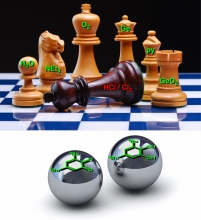McGill researchers have discovered a safer and more efficient technique for testing new drugs while they are in development.

Helium is probably not the first thing that comes to mind for most people when they think about recycling – unless they’re experimental chemists working in McGill’s Nuclear Magnetic Resonance (NMR) facilities.

Karine Auclair, professor in the Department of Chemistry, is the 2023 recipient for the Clara Benson Award from the Chemical Institute of Canada (CIC).
Sponsored by the Canadian Council of University Chemistry Chairs (CCUCC), the Clara Benson Award is presented to recognize a woman who has made a distinguished contribution to chemistry while working in Canada.
Here is what the CIC had to say about Auclair's work:
On January 12, the Federal Government announced more than $295 million for science, research, and engineering in Canada through the Canada Research Chairs (CRC) 2020-2 cycle, the New Frontiers in Research Fund (NFRF) 2020 Transformation results, and the Tri-agency Scholarships and Fellowships.
Read the full story on the McGill Newsroom or the McGill Reporter.
Below is a list of all CRCs awarded in the 2020-2022 Cycle and McGill Co-PIs and Collaborators NFRF-T 2021-2027:
The Public Health Agency of Canada has an urgent need for reagents for use in COVID-19 testing. The National Microbiology Lab (NML) is specifically looking for items on the list in the table below, as well as any other RNA extraction reagents.
Please connect directly with Mette Cornelisse, Office of Chief Science Officer (mette.cornelisse [at] canada.ca) and Rita Finley, Office of Chief Science Officer (rita.finley [at] canada.ca).

Scientists have been looking at pollution affecting the air, land and water around the Athabasca Oil Sands for some time. After looking at contaminants in snow taken from up-to 25 km away from the oil sands, a McGill-led scientific team now suggests that oil sand pollution is also affecting the weather patterns in the surrounding regions.

A cup of tea may be a cure for rainy days, but the soothing cup of the brewed beverage may also come with a dose of micro- and nano-sized plastics shed from plastic bags, according to researchers at McGill University. While the possible health effects of ingesting these particles are currently unknown, the new research published in the American Chemical Society journal Environmental Science & Technology suggests further investigation is needed.

Department members Tara Sprules, manager of the national high-field NMR facility QANUC, and Robin Stein, chemistry department (MC2) NMR/EPR manager, have just had an article published in the CIC newsletter about helium. Together, they use about 2900 L of helium annually to make their eight NMR spectrometers function, and recent cost increases have left them feeling nervous about the future.
The John S. Bates Memorial Gold Medal is the highest distinction awarded to a Member of PAPTAC (the Pulp And Paper Technical Association of Canada). The Gold Medal is in recognition of long term scientific and technological contributions to the pulp and paper industry. The last time this medal was awarded to a Member of the Chemistry Department was in 1994, when David Goring received this award. Prof.
Professor Tomislav Friščić is the recipient of the prestigious Steacie Prize for Natural Sciences for his exceptional contributions to Green Chemistry research in Canada. He is the third McGill professor to win the Steacie Prize, and the first ever McGill professor to win it for chemistry. The two previous winners from McGill are Vicky Kaspi, Physics and Astronomy (2006) and Phil Gold, Medicine (1973).

The International Union of Pure and Applied Chemistry invites you to Montreal, Canada, for the International Biotechnology Symposium and Exhibition on August 12-17, 2018. This 18th edition of the symposium is co-organized by the National Research Council of Canada, McGill University, the University of Waterloo, and BIOTECanada.
Submit an abstract – Deadline extended to May 11, 2018

Researchers at McGill University have invented a new technique for measuring how quickly drugs interact with their molecular targets. The discovery provides scientists with a new way to investigate the effectiveness of drug candidates that might otherwise have been overlooked.
The new method centres on the principle of enzyme inhibition. Countless pharmaceuticals, ranging from antibiotics to chemotherapy drugs, work by blocking the action of enzymes, and the search for new enzyme-inhibiting substances remains a major focus of drug development.

Mechanochemical method developed by Tomislav Friščić and team makes noble metal compounds without solvents or harsh reagents

McGill University researchers have chemically imprinted polymer particles with DNA strands – a technique that could lead to new materials for applications ranging from biomedicine to the promising field of “soft robotics.”
In a study published in Nature Chemistry, the researchers describe a method to create asymmetrical polymer particles that bind together in a spatially defined manner, the way that atoms come together to make molecules.


